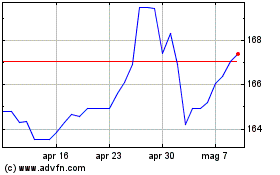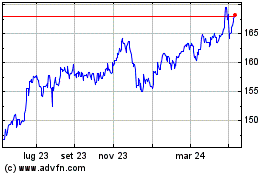Euro Slips After ECB Decision
16 Marzo 2023 - 1:14PM
RTTF2
The euro dropped against its major rivals in the European
session on Thursday, after the European Central Bank raised its key
interest rates by 50 basis points but indicated that the elevated
level of uncertainty affirmed the importance of a data-dependent
approach on future moves.
The Governing Council, led by Lagarde, raised the main
refinancing rate to 3.50 percent, the deposit facility rate to 3.00
percent and the marginal lending rate to 3.75 percent. The move was
in line with economists' expectations.
"The elevated level of uncertainty reinforces the importance of
a data-dependent approach to the Governing Council's policy rate
decisions, which will be determined by its assessment of the
inflation outlook in light of the incoming economic and financial
data, the dynamics of underlying inflation, and the strength of
monetary policy transmission," the ECB said.
The Governing Council is monitoring current market tensions
closely and stands ready to respond as necessary to preserve price
stability and financial stability in the euro area.
The ECB also raised the growth and core inflation projections
for the euro area for this year. The ECB staff now sees average
growth of 1.0 percent and core inflation at 4.6 percent this
year.
The euro was down against the greenback, at 1.0550. The pair had
closed Wednesday's deals at 1.0576. The euro is likely to challenge
support around the 1.04 region.
The euro pulled back against the pound, with the pair trading at
0.8761. The euro-pound pair had finished yesterday's trading
session at 0.8770. Should the euro falls further, it is likely to
test support around the 0.86 region.
The euro touched 139.11 against the yen, its lowest level since
January 20. The pair was worth 140.99 when it ended deals on
Wednesday. The euro is seen finding support around the 137.00
level.
Data from the Ministry of Finance showed that Japan posted a
merchandise trade deficit of 897.7 billion yen in February.
That exceeded expectations for a shortfall of 1,069.4 billion
yen following the 3,498.6 billion yen deficit in January.
The euro fell to 0.9798 against the franc, from a 1-week high of
0.9881 seen at 6 pm ET. At Wednesday's close, the pair was valued
at 0.9868. Next key support for the euro is seen around the 0.96
mark.
The euro edged down to 1.5903 against the aussie from
yesterday's close of 1.5970. Further drop in the currency may face
support around the 1.57 level.
The euro eased off to 1.7133 against the kiwi from Wednesday's
close of 1.7086. On the downside, 1.67 is possibly seen as its next
support level.
In contrast, the euro reversed from an early low of 1.4516
against the loonie, rising to 1.4613. The euro was trading at
1.4555 per loonie at yesterday's close. If the currency continues
its uptrend, 1.48 is possibly seen as its next resistance
level.
Grafico Cross Euro vs Yen (FX:EURJPY)
Da Mar 2024 a Apr 2024

Grafico Cross Euro vs Yen (FX:EURJPY)
Da Apr 2023 a Apr 2024
